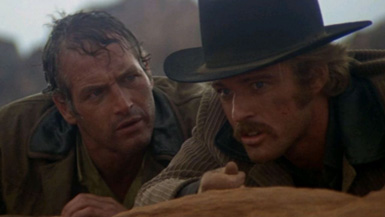A-List: Best Buddy Robber Films
By J. Don Birnam
July 11, 2016
3. The Sting (1972)
Call me unoriginal but there was this guy named George Roy Hill, and he directed a movie called Butch Cassidy and the Sundance Kid, starring Paul Newman and Robert Redford.
Three years later, this same man directed these same men in a more modern movie called The Sting. This time around, they won seven Academy Awards even if at least half the prizes went for their original effort.
Truth be told, it’s hard to say which of the two is the better movie - The Sting is much more user-friendly and much less demanding of its audience in terms of both guts and runtime. But, the Sting did win seven Oscars - that’s a lot - so the tie goes to the victor I suppose.
Plus, despite its facile friendships and unchallenging motifs, The Sting is one of the original caper/audience confusion stories. Newman and Redford portray Gondroff and Hooker, two con artists who hatch an elaborate scheme to defalcate and outrun a corrupt police officer played by Robert Shaw. The twists and turns are plenty - with officers not being who you thought they were, in people even being shot in the back.
While the story flutters along without much seriousness, I was taken aback by the complexity of the ultimate scheme, and how little I saw it coming. Plus, again, Redford and Newman just work as a screen duo, there are few more believable together than those two.
2. Ocean’s Eleven (2001)
Not to be confused with Ocean’s 11, the original. Sorry, but I bet you knew this was coming. Yes, I’m aware that this was a remake, and yes, I’m aware that there are, well, 11 buddies here. But the focus of the film is on the George Clooney and Brad Pitt characters, both of whom have personal motivations for wanting to pull off a heist of three Vegas casinos belonging to Andy Garcia in this now classic remake. (Which, on its own, will be remade with an all-female cast soon, but that’s another topic).
The friendship between the two heart-throbs works, and the movie is clever to the last moment. Perhaps I was less cynical or less exposed back then, but the twists keep on coming in ways you don’t always predict. In the day of iPhones and SnapChat, I don’t know that you can make a movie like this, but back then, Steven Soderbergh (who also made Traffic and Erin Brokovich that year - WTF) really knew how to extend the limits of the available technology.
The last few scenes, of course, of Danny Ocean and Rusty Ryan with the gang at the fountains of the Bellagio, is actually moving on top of everything else. Could it be George Clooney’s friendly affectation? Brad Pitt’s bro-like metrosexuality? The two seem inseparable as friends, and there’s no iota of doubt that you’re rooting for them to the last shot.
1. Bonnie and Clyde (1967)
How fitting that the number one pick today was a fellow Best Picture nominee (and loser) to In the Heat of the Night, which we discussed in last time’s column about buddy cop films.
Leave aside the fact that the Academy, not surprisingly, could not bring itself to root for the bad guys and had to award its top prize to the movie about doing good. There is no doubt that Bonnie and Clyde is the better film, historically and objectively, and that is no knock on In the Heat of the Night.
From a historical perspective (and books have been written about this so excuse my brevity), Warren Beatty almost singlehandedly killed (pun intended) the odious Production Code by getting this movie made despite censor objections over its glorification of violence and strong intimations of Clyde’s bisexuality. His will and gumption alone made this movie a success - one of the few that has caused film critics to go back after initial dismissals to swallow crow.
And in terms of the film itself, how can you argue? This is, in fact, the precursor to and the inspiration for movies like Butch Cassidy. Back then you couldn’t really have complex crime capers with poof and magic to fool the audience. But what Beatty and Faye Dunaway achieved here (as well as the young Gene Hackman) was to raise the bar from the late 1960s ennui straight into the shocking violence that dominated the news then. It’s not so dissimilar to what we see happening in our streets now, of course, and not dissimilar to the anxiety Hollywood is expressing over these trends.
Bonnie and Clyde are young and somewhat in love, but they are mostly bored. The spree of bullets that follows them is jarring and symbolic, and the deep red that tinges the screen at shocking moments is telling.
Despite their selfishness, their truancy, and their abhorrent behavior, you root for them, you really do. The consequences of that are, of course, disastrous.
Continued:
1
2
|
|
|
|




